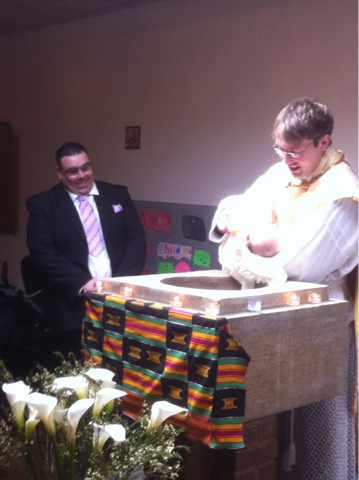"Love one another as I have loved you" - there we have it, a new commandment. Fairly simple to preach about, you would think - just do what Jesus says!
But there are dangers here. If the first thing we take away from this evening's gospel reading is that we should
do things then we are likely to become absolute menaces. If what we hear is "get up, go and love, do loving things, and do them now..." we will become some kind of frenetic do-gooder, ever in earnest search for the next opportunity to love, unshaken in our self-confidence and sense of rightness, convinced that the world would be a much better place if only everyone else loved, just like we do. At best, we would be a pain in the neck. At worst we would be deluded - in Christian terms, we would be the kind of heretic who believes that we can save ourselves. Either way, in spite of our initial intention, we would certainly end up being profoundly unloving in practice. Anyone who has ever been on the receiving end of the ministrations of the kind of person I have described will know what I mean.
The reason for this is a peculiar feature of love. I cannot
give love until I have
received love.
Look at what happens to people when they are systematically denied love. They turn in on themselves, putting up defences against a fundamentally hostile world. Other people become viewed simply as threats, and fear of this sort prevents the kind of giving-of-self which we call 'love'. Love is a way of living in the world, a way of being towards another person which sees their freedom as a gift to me, rather than a threat. I cannot live this way unless someone has loved me first, for the simple reason that if I am only ever seen as a threat by others, I will never get the opportunity to develop my own loves. I too, will always have to be on my guard. I need to be given space to love; which is to say, I need to have been loved before I can love.
It is like this with our ordinary, day-by-day loves. It is like this too with our loving relationships with God - the kind of relationship that the Bible calls 'covenants'. Unless God loves me first, I cannot love God. I can be in awe at God, for sure; I can fear God, or plead with him. But what I cannot do, without God's gift of love (what Christians call 'grace'), is
love God. Jesus washes his disciples feet and then, only then, when they have received the serving love of the Lord, are they told to wash one another's feet. If we want to love the world with the same love that Christ did - and that is the way of life to which we are called by our covenant relationship with God - then we have to allow ourselves to be loved by Christ. "Unless I wash you, you have no share with me".
We need to open ourselves up to love. Otherwise we will not be able to serve.
We are reminded of this by the foot washing at this evening's Mass. The celebrant, representing Christ, washes the feet of members of the congregation. They don't do anything. They just sit there, having their feet washed - receiving, rather than giving. In our frantic world, this can be a difficult thing to do.
And yet it is what we do, at a indescribably deeper level, at every Mass. At every Mass the convenant of love between God and human beings is signed and sealed. God draws us, his People, into the offering of his Son on the altar, and gives us his Body and Blood of food. Here we have the supreme sign, and reality, of God's love for us. And it is given to us as a gift.
The gift of God's life in the Eucharist is, quite literally, ours for the taking. If we open ourselves up to it we will be transformed, and become the kind of people who can love extravagantly, because we have been loved extravagantly ourselves. Love is the beginning and end of Christian living. Love is the beginning and end of the Mass. Love is the reason we were created, and it is in love that we will find ultimate fulfilment, a fulfilment we look forward to, and receive as an already present gift, every time we do what the Lord said this night - "do this in remembrance of me".
 Today is the
Christian Festival of Pentecost. At the heart of this feast day is the
remembering of the events that are recorded in the Acts of the Apostles when
the Holy Spirit descended upon a small group of followers of Jesus Christ and
fired them with an unquenchable faith in God and their ability, by God’s
Grace, to change the course of history for the world.
Today is the
Christian Festival of Pentecost. At the heart of this feast day is the
remembering of the events that are recorded in the Acts of the Apostles when
the Holy Spirit descended upon a small group of followers of Jesus Christ and
fired them with an unquenchable faith in God and their ability, by God’s
Grace, to change the course of history for the world.






















